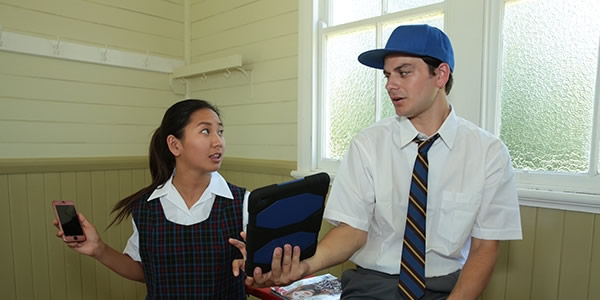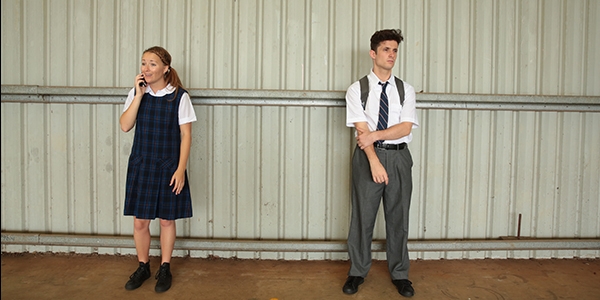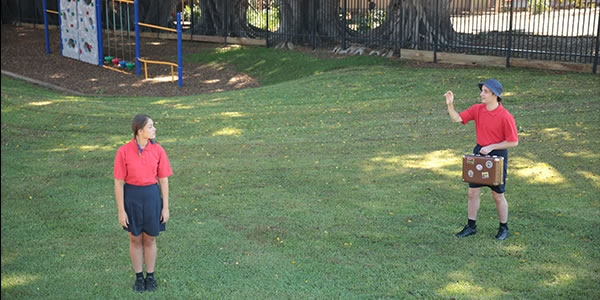School is back, after weeks of unstructured play, lounging around the swimming pool, and plunging into the ocean. Days with little to no structure are behind us, as parents prepare school lunches, and primary and secondary students pack their school bags, ready for school.
But how ready are students?
Associate Professor Stacey Walters, Associate Professor Leanne Lester and Professor Donna Cross suggest that transitioning into high school, or a new school can be a difficult time for some students.
According to their research, some of the key worries students have are:
• how much homework they would have to complete
• finding their way around or getting lost
• classes being hard
• unfamiliar teachers
• and getting to class on time.
The Raising Children parenting website also suggests new students are worried about learning new routines, making new friends, and adjusting to increased workload.
So how can parents, teachers and educational theatre support young people starting at a new school for the first time, or transitioning into high school?
Have a positive attitude
Associate Professor Leanne Lester and her team found that having positive expectations helps ease transition.
‘Expecting a positive experience during transition impacted positively on students in both the short and long term,’ Lester tells Teacher Magazine.
Positive expectations don’t need to come from thin air. Parents can begin at home by talking to kids about how they are feeling. Parents can help validate young people’s emotions by normalising them. It is normal to worry about starting school. Parents can emphasise the positive aspects of starting in a new environment. If the students know one person at the new school, arranging a meet up before school starts can help the student feel more confident.
Talk to students and your children about the positive side of new experiences. Yes, starting at a new school can be daunting. But it can also be an opportunity to make new friends, and try things you have never tried before.
Parents can also lead by example. Role model positivity and confidence for your children starting in a new environment, so they have a lead to follow.
Talking to children about their worries is important, but talking too much can also stimulate worry. Educational theatre is an effective way of showcasing emotions and behaviours, so kids can make their own decisions about how to act in a certain situation.
In Brainstorm Productions plays like The Hurting Game and Verbal Combat, the audience sees the consequences of destructive attitudes and behaviour. They also see what happens when characters support each other. Daniel, the bystander in Verbal Combat shows support for the new girl. He helps her seek professional support. The audience learns the value of being a good friend and supportive person to others on the first day.
In The Hurting Game, the lead characters’ friendship is also a positive resource, which helps the characters get to a good place.

Develop coping skills
Coping skills help young people adjust to new experiences, and handle difficult emotions. Positive coping skills include successful problem solving, being able to ask for help, and taking time to complete a task.
Suggestions for developing coping skills include:
• demonstrating and role modelling positive coping skills at home or in the school environment; this could be as simple as taking deep breathes in a stressful situation
• comforting and normalising stressful experiences
• helping kids prepare for difficult experiences by talking about their concerns
• encouraging kids to seek help; this may involve finding out who is responsible for pastoral care or counselling services in the school
• helping young people develop problem-solving strategies; a useful resource can be viewed here.
A number of Brainstorm Productions’ high school plays demonstrate some of the issues young people face when they are in new situations. The Hurting Game, for instance, is about two students who develop a computer game that helps them identify how unhealthy patterns in their past have contributed to their actions in the present. The play flashes back to the characters’ first day of school, and first day of high school. The audience experiences the challenges the characters face, and can clearly see which strategies the characters could have used, which would have been more helpful to them.
The Hurting Game, Sticks and Stones, and Verbal Combat all give high school audiences an opportunity to reflect on what is challenging on that first day, and demonstrate strategies that could be used to make life easier.
Help new students feel safe and confident

A new school is a big deal for students, particularly if they don’t know many people. Helping kids feel safe can improve the young person’s confidence when starting in a new environment.
Positive parenting coach and school educator, Anna Partridge, provides suggestions for ways parents can help their children feel safe and confident when starting at a new school:
• ‘Talk to your kids about what to expect during their first day and create clear expectations. You might talk about what time you will get to school on the first day, how you will get to school, and any familiar faces that may be there. Maybe they have been on orientation. Talk about that, recap how to make good friends or start a conversation with someone new and where you will meet them at the end of the day.
• ‘Set up a good routine from Day One so the kids have a stable place to come home to. There is so much ‘newness’ to take on, having a stable, predictable home environment helps.
• ‘Stay strong and be positive. Kids will take their lead from you so go in strong. Let your feelings bubble up when you leave school, but not with your kids.’
New students feel more comfortable and positive if they are familiar with their new environment. Walking around the new school with your child can help them feel confident to navigate the new environment when they start school. Make sure your child has a printed layout of the school with them on their first day, so they can find their class on time. Print out the class timetable at home, so your child knows when they need to be where.
Schools also provide transition programs and pastoral care to help new students settle in. These orientation programs help students get to know each other, as well as the layout of the school.
Whether students are starting at a new school, starting high school or just returning to school after a long break, having a positive attitude and clear expectations, and feeling safe and confident both at home, and in the school environment will make this transition smoother, and less stressful.




